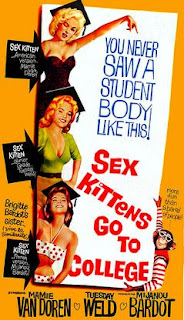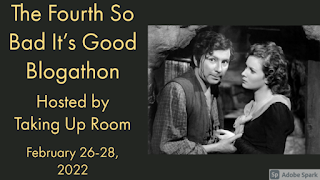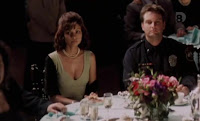The term psychotronic refers to movies made on low budgets, often in the science fiction, fantasy, or horror genres, that were ridiculed by critics. There is perhaps no movie more "psychotronic" than Sex Kittens Go to College (1960). The comedy anticipated AIP's "Beach Party" movies in combining a college setting with touches of science fiction (and nearly everything else), all made on a shoe-string budget. Quite naturally, critics hated it. Also quite naturally, it has become a cult film.
Sex Kittens Go to College stars Mamie Van Doren as Dr. Mathilda West, a super-genius who holds thirteen different degrees and speaks 18 languages. She also happens to be a buxom blonde who drives the male staff and students at Collins College to distraction (no surprise there given she is played by Mamie Van Doren). In addition to a super-intelligent beauty, Sex Kittens Go to College also involves a robot, gangsters, a chimp, and the usual teen hi-jinks.
Sex Kittens Go to College originated with producer, director, and screenwriter Albert Zugsmith. Albert Zugsmith began his career as a journalist, publicist, newspaper broker, and attorney. Among other things, he represented Superman creators Jerry Siegel and Joe Shuster in their unsuccessful lawsuit against National Periodical Publications for the rights to Superman. He went from being a broker for newspapers, radio stations, and television stations to producing motion pictures. He started out with such low budget movies for RKO as Captive Women (1952) and Sword of Venus (1953) before producing such films as Raw Edge (1956), Star in the Dust (1956), and Touch of Evil (1958) for Universal.
Albert Zugsmith moved from Universal to MGM. His first film for MGM was High School Confidential! (1958), starring Russ Tamblyn and Mamie Van Doren. Mr. Zugsmith had met Miss Van Doren at the Universal commissary. He cast her in the Western Star in the Dust despite objections from Universal executives. Following Star in the Dust and High School Confidential!, Mr. Zugsmith and Miss Van Doren would make five more films together. Initially Albert Zugsmith did not direct the films he produced, but all of that changed with College Confidential (1960). He also directed Sex Kittens Go to College (1960), which was filmed before College Confidential, but was released after it. Both films starred Mamie Van Doren.
Albert Zugsmith would have some problems with MGM regarding the title of Sex Kittens Go to College. It went through such titles as Sexpot Goes to College, Sexpot Versus Teacher, and Teacher Was a Sexpot. MGM objected to the word "sexpot" as being too salacious. Mr. Zugsmith and MGM then settled on the title Sex Kittens Go To College as if the term "sex kitten" was somehow less provocative than "sexpot." When released to television it would undergo another title change, being renamed the much less provocative Beauty and the Robot.
Sex Kittens Go to College was filmed from November to December 1959. Despite this, it was released in October 1960, only two months after College Confidential. To put it lightly, the film was less than well received by critics. Despite the critics' opinions, Sex Kittens Go to College did relatively well at the box office for a low budget film.
Mamie Van Doren was hardly the only big name to star in Sex Kittens Go to College. Martin Milner, who had appeared in such films as Pete Kelly's Blues (1955) and Sweet Smell of Success (1957) and would start his run as Tod Stiles on the TV show Route 66 not long before the movie was released, played Mamie Van Doren's love interest, George Barton. Jackie Coogan played gangster Wildcat MacPherson, while John Carradine played Professor Watts and Louis Nye played Dr. Zorch. Tuesday Weld played college student Jody; she was appearing as Thalia Menniger on The Many Loves of Dobie Gillis even as Sex Kittens Go to College was filming. The movie also featured Conway Twitty, Vampira, and, in minor roles, Charlie Chaplin Jr. and Harold Lloyd Jr. Conway Twitty also performed the movie's title song, "Sexpot Goes to College." Although today firmly identified with country music, at the time Conway Twitter was counted as a rock 'n' roller.
As to Thinko, the robot who played a major role in the plot, he was not a mere prop. In reality Thinko was Elecktro, a robot built by Westinghouse Electric Corporation between 1937 and 1938. In 1939 he was exhibited at the New York World's Fair. In the Fifties Elektro toured the United States, promoting Westinghouse. From the late Fifties into the early Sixties, he was displayed at Pacific Ocean Park in Venice, California. He is currently owned by the Mansfield Memorial Museum in Mansfield, Ohio.
Perhaps because of the low budget, it sometimes seems as if they simply made Sex Kittens Go to College up as they went along. The film is certainly over the top. After all, it combines a plot lifted from Ball of Fire (1941) with a robot, a bongo playing chimpanzee, gangsters, college politics, and college hi-jinks. It should be no surprise that in many ways Sex Kittens Go to College is a bad movie. Some might even say that it is a very bad movie. Despite, this somehow it all works. Sex Kittens Go to College is so outrageous, so blatant in its excesses, that it can't help but be entertaining. Indeed, the cast, from Mamie Van Doren to Martin Milner, all seem to be having fun in the movie. There is perhaps a good reason that while critics hated Sex Kittens Go to College, it went onto become a cult film anyway.





